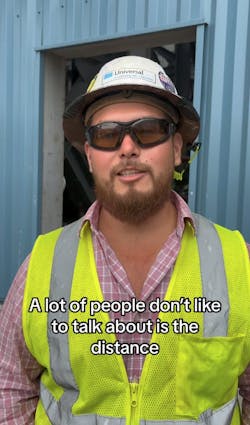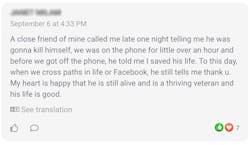How Lexicon is tackling the construction industry's massive mental health crisis
The construction industry is ranked among professions as one of the highest for suicides, with a suicide rate four times higher than the national average. As a male-dominated industry, mental health is often a taboo topic to discuss on the jobsite; the predominantly male workforce has been told for decades to “put up and shut up.”
One company has begun to challenge this statistic with a dedicated, comprehensive, and surprising mental health awareness campaign. Lexicon, a steel fabrication and commercial construction company based out of Little Rock, Ark., has—in just a few short months—redefined what it means to make mental health a priority. Spearheaded by Roslyn Wyman, Director of Training & Development, Lexicon has substantially turned the conversation on its head with a year-long program all about mental health awareness.
As Wyman discussed in her session Strong as Steel: Building Mental Might at the American Institute of Steel Construction's Steel Conference, “it’s not about checking a box; we talk about mental health every day, every week, every month.”
Laying The Foundation for a Mental Health Program
Understanding the audience, in this case the construction workforce, was key to starting the program. If the shocking suicide rates in the profession wasn’t motivating enough to act, what would be?
From the start, Wyman knew there had to be top-down buy in from leadership. If they’re not on board, no one else will be. Lexicon’s CEO, Patrick Schueck, was key in expressing vulnerability and openness on both video and in real life.
The committee that was put together to spearhead the mental health program started by creating candid videos of those in the company. They would take videos of workers on the jobsite openly explaining their struggles, or film leaders at Lexicon talking about the importance of mental health at work.
Interest in the program grew as Wyman and the committee developed more ways for employees to connect with one-another. They continued strong by partnering with the Mental Health Center of Wellbeing for free mental health first aid certification. After putting out a general interest email and expecting 10 people to show, they received 55 participants within 30 minutes.
From there, harassment training was brought in—with sessions available in both English and Spanish—where 100% of leadership roles were in attendance.
With so many opportunities to talk about mental health in person, there needed to be a way for Lexicon employees to communicate with each other virtually. Enter: LexCOMM.
The heart of the Lexicon’s program lies in a digital app, an “internal Facebook” as Wyman calls it. Available to all the company’s 3,000 employees, LexCOMM is an unmoderated social networking board where employees go to post their thoughts, feelings, and advice for others in the company. It acts as a sounding board with both Spanish and English postings and the ability to translate from one language to the other.
Over 35% of the company’s workforce is Hispanic. Lexicon’s Hispanic population has felt especially unified through the campaign, with Spanish posts and comments uploaded to the platform reaching upwards of 10 times per day.
As a bonus, Lexicon even conducted a giveaway for active participation. Yeti coolers, Carhartt jackets, gift cards, and stickers for hard hats were among some of the prizes awarded. But the grand prize? Something intangible: A donation to charity.
Extending beyond the digital, Wyman investigated Little Rock’s community resources to see what they could offer for free. Buttons, flyers, pamphlets, you name it. Lexicon’s marketing department helped design job site posters and stickers, leading people back to the mission critical message that we are all in this together. However, every community is different, and pain points still exist in finding all the right resources region wide.
So, what’s the secret? There’s no one person who does all the work. A year-round mental health campaign doesn’t fall entirely on Human Resources or upper leadership—everyone who joins in on the committee is given a “job” to help. This could mean compiling provocative questions to pose to employees, creating images to disseminate on LexCOMM, or responding to poignant questions being posed on the forums.
Lexicon’s program is indeed comprehensive, but it had to start from somewhere, right? What can AEC firms looking to extend their mental health programs do today as a steppingstone?
Advice for AEC Firms on Starting Mental Health Awareness Programs
Simple tips for firms looking to get started or improve their mental health programs:
- Get the buy-in from the top down. If the CEO, President, and other leaders aren’t on board, neither will anyone else.
- Extend beyond “mental health months” and make it a year-long goal. Through mental health awareness month is in May, and is a good place to start, aim to continue the conversation every day.
- Avoid alienation by considering the comfort of native Spanish speakers. For Wyman, a “rule” of hers is that anything they post in English must also be posted in Spanish.
- Start the conversation, even in small ways. Whether it be in group chats, posters hung on the message board, or conversations on the jobsite—the mental health discussion shouldn’t be taboo.
About the Author

Quinn Purcell
Quinn Purcell is the Managing Editor for Building Design+Construction. He is a graduate of Idaho State University with a Bachelor of Arts in Communication, and an emphasis in Multiplatform Journalism. He specializes in video, photography, copywriting, feature writing, and graphic design.


